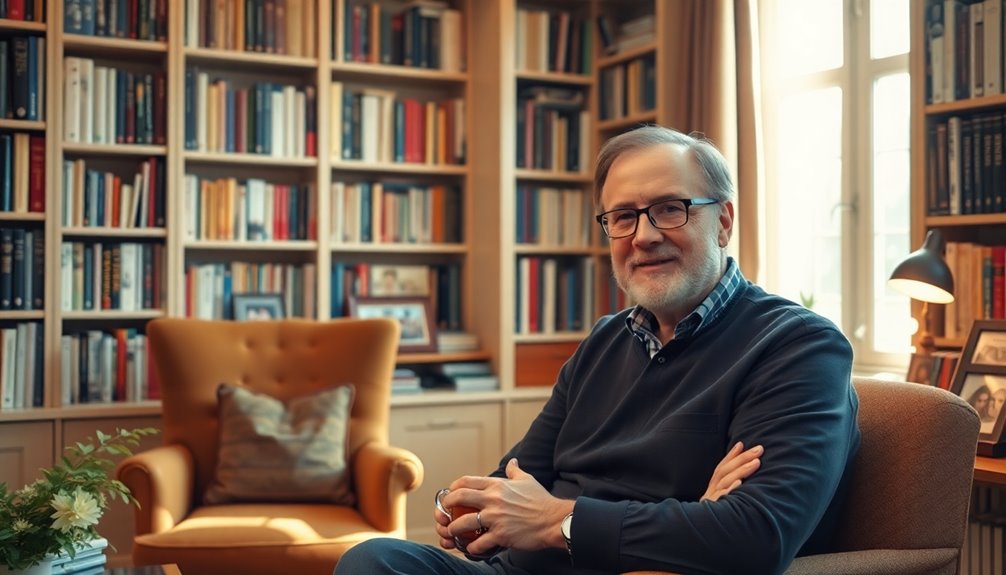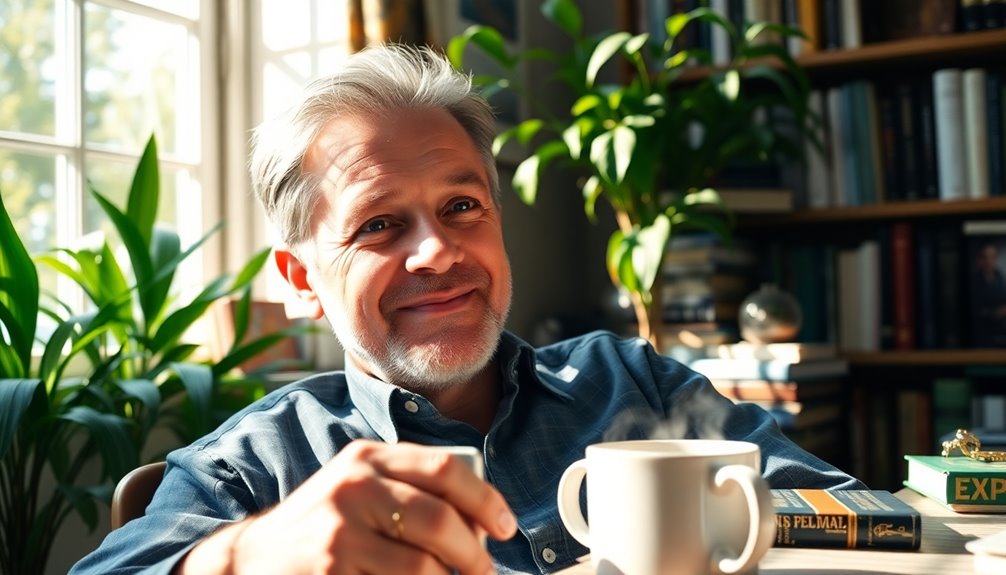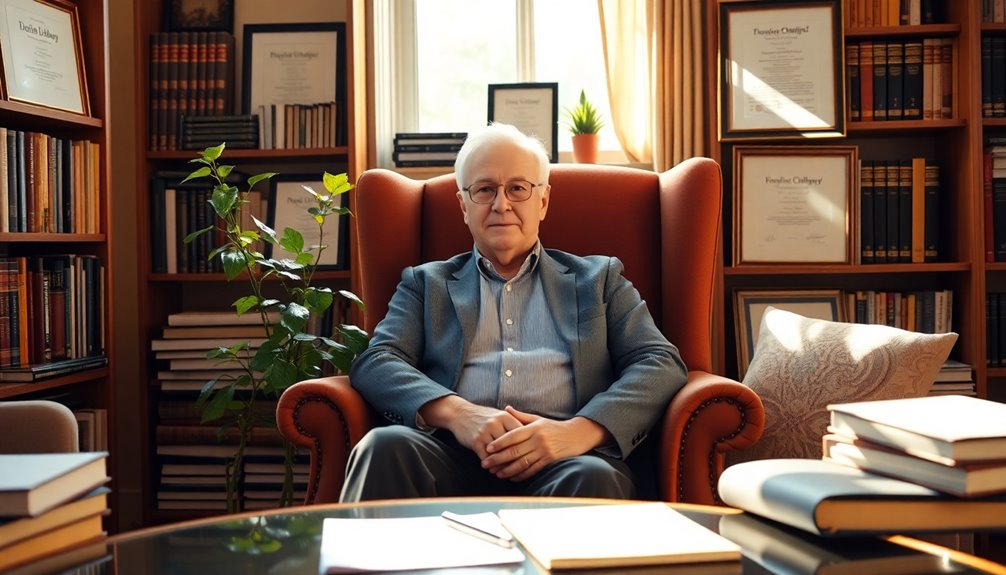Dr. John Delony is a prominent mental health expert with a strong background in psychology and higher education. You'll find he holds advanced degrees and certifications, making him well-versed in emotional wellness and counseling strategies. Through bestselling books and his popular show, he shares practical insights on managing anxiety and stress. His approach emphasizes community connection and proactive mental health care. Delony believes mental wellness is essential for healthy relationships, and he actively advocates for better access to mental health resources. By exploring more about his work, you'll discover valuable strategies for enhancing emotional well-being.
Key Takeaways
- Dr. John Delony holds a Ph.D. in higher education administration and is pursuing a second Ph.D. in counselor education and supervision.
- He is a bestselling author, known for books like "Own Your Past Change Your Future" and "Redefining Anxiety," focusing on mental health and emotional wellness.
- With over 15 years in higher education administration, he has experience as Dean of Students and emphasizes the importance of mental health in educational settings.
- Delony advocates for accessible mental health care and proactive strategies, integrating technology like mental health apps into daily life.
- He hosts "The John Delony Show," which ranked No. 9 on iTunes, promoting mental health awareness through community engagement instead of traditional book tours.
Educational Background

Dr. John Delony's educational journey is both diverse and impressive. You'll find he graduated from Lubbock Christian University in 2000 with a bachelor's degree in humanities and psychology after exploring multiple majors. Influential professors like Dr. Andy Young, Dr. Beth Robinson, and Dr. Susan Blassingame shaped his academic path, while Dr. Jeff Cary guaranteed he maintained academic rigor.
Continuing his education, he earned a master's degree in higher education administration from Texas Tech University. He further enhanced his expertise by completing Harvard's Higher Education Management Development Program in 2013. His graduate studies focused on counseling and psychology, allowing him to identify areas for improvement in his counseling skills.
Dr. Delony holds a Ph.D. in higher education administration and is currently pursuing a second Ph.D. in counselor education and supervision, both from Texas Tech University. His training in counseling and higher education has been enriched by guidance from mentors in the field. Additionally, he's gained various certifications, including Critical Incident Stress Management and as a Level One Civil Rights/Title IX Investigator, demonstrating his commitment to professional development and student support. His appointment as associate provost and dean of students at Belmont University reflects his dedication to enhancing student-centered living-learning environments.
Professional Career

With a solid educational foundation, John Delony launched a diverse professional career that spans over 15 years in higher education administration. He served as Dean of Students, focusing on student affairs and counseling. In these roles, he dealt with personnel, student, and family issues, often providing psychological counseling. However, he noticed a disconnect between academic training and real-world application, prompting a change in his approach.
Eventually, John shifted to public engagement, where he made significant strides in mental health advocacy:
- He started "The John Delony Show," which ranks No. 9 on iTunes in the mental health category, attracting over 18 million listeners.
- Instead of a traditional book tour, he opted for speaking engagements, aiming to make mental health information accessible to a broader audience.
- His presentations often include personal anecdotes to illustrate key mental health concepts.
- John addresses the epidemic of loneliness, advocating for nurturing relationships and creating new connections. He emphasizes that the biochemical effects of loneliness are comparable to those of smoking cigarettes, highlighting the seriousness of this issue.
Throughout his career, he emphasizes authenticity in interactions and critiques the current culture's impact on mental health, advocating for a holistic approach beyond therapy and medication.
Expertise and Publications

Dr. John Delony's bestselling books offer valuable insights into mental health and emotional wellness. You'll find key topics like the connection between financial stress and emotional well-being, along with practical strategies for coping. These publications reflect his extensive expertise and commitment to helping others navigate their challenges. Additionally, Dr. Delony emphasizes the importance of emotional well-being in fostering healthy relationships and effective communication.
Bestselling Books Overview
John Delony's bestselling work, *Own Your Past Change Your Future*, showcases his profound expertise in mental health and wellness. Published by Ramsey Press on April 19, 2022, this #1 Wall Street Journal National Bestseller dives deep into themes of trauma, relationships, and healing. The book emphasizes the importance of genuine connections over fleeting social media friendships. It is also noteworthy that the hardcover edition of this impactful book is priced at $31.99(hardcover price).
Here are some key elements that make this book impactful:
- Five-Step Path to Well-Being: Dr. Delony lays out actionable strategies for readers to improve their mental health.
- Focus on Grieving and Healing: He addresses how to navigate life's challenges and the process of transforming thoughts and actions.
- Modern Societal Issues: The book tackles stress, loneliness, and the role of medication in today's fast-paced world.
- Redefining Trauma: Delony encourages readers to rethink how trauma influences their lives and offers insights on overcoming its effects.
In addition to this bestseller, his other notable works, like *Redefining Anxiety* and *Building a Non-Anxious Life*, further solidify his reputation as a mental health expert committed to helping individuals reclaim their lives.
Key Topics Explored
Mental health expertise shines through in John Delony's work, which spans decades of counseling and public engagement. His extensive experience covers a range of vital topics that resonate with many seeking guidance in their personal and financial lives.
| Key Topics | Focus Areas |
|---|---|
| Emotional Wellness | Managing trauma, anxiety, and stress |
| Financial Health & Stress | Correlation between finances and mental health |
| Relationship Dynamics | Improving communication and setting boundaries |
| Practical Strategies | Daily check-ins, gratitude practices, and goal tracking |
Delony emphasizes the importance of personal connection and self-awareness while addressing mental health challenges. As the host of *The Dr. John Delony Show*, he tackles diverse subjects, providing actionable advice. His discussions often reveal the essential link between financial stress and emotional well-being. Furthermore, he encourages participation in monthly mental health events, which offer valuable resources and support for individuals navigating their mental health journeys.
Moreover, he advocates for practical strategies to enhance both financial and emotional stability, urging you to set long-term goals while taking immediate actions. Delony's insights not only empower individuals but also promote the idea that mental health care should be as accessible as possible through teletherapy.
Personal Experience With Anxiety

Alarm System Perspective
Living with the constant hum of worry can feel like having an alarm system that never shuts off. Your body may react to everyday situations as though they pose a threat, leading to physiological responses that can be overwhelming. You might notice your heart racing, your palms sweating, or even shortness of breath at seemingly harmless moments. This dysregulation of your nervous system can keep you on edge, making it hard to differentiate between real dangers and minor stressors.
Consider how this alarm system impacts your daily life:
- Overthinking: You find yourself racing through thoughts, worrying about the worst possible outcome.
- Physical Symptoms: You experience stomach pain, dizziness, or even trembling without understanding why.
- Avoidance: You might avoid certain situations to escape the anxiety, leading to isolation.
- Cognitive Overload: You struggle with memory issues as your mind gets stuck in a loop of "what ifs."
Understanding this alarm system perspective can help you recognize the patterns of anxiety, even if it feels relentless. It's a vital step towards finding ways to address it effectively. The amygdala's activation serves as a crucial mechanism in your anxiety response, signaling danger without distinguishing between real and false threats.
Personal Management Strategies
Recognizing the relentless nature of your internal alarm system is just the beginning; taking charge of your well-being requires actionable strategies. Start by incorporating regular exercise into your routine. Activities like walking, yoga, or hitting the gym release "happy hormones" that can alleviate anxiety. Pair this with healthy eating—focus on fruits, vegetables, and whole grains, while cutting back on caffeine and sugar.
Prioritize quality sleep, aiming for 7-9 hours each night. Develop a consistent bedtime routine, and avoid screens before bed. Being outdoors can also work wonders; nature has a way of calming your mind. Engage in activities you enjoy, as they can reduce stress considerably. Additionally, practicing slow breathing can help you regain control over your physiological response during anxious moments.
On the emotional front, practicing mindfulness through meditation or deep-breathing exercises helps center you in the present. Journaling your thoughts can reveal anxiety triggers, while challenging negative self-talk fosters resilience. Set boundaries to protect your time and energy, and practice self-compassion.
Socially, build a supportive network and don't hesitate to seek professional help. Connecting with others and sharing experiences can create a deeper sense of community and understanding. Implement these strategies, and watch your anxiety decrease over time.
Community and Cultural Impact

Addressing the cultural factors that contribute to anxiety reveals the critical importance of community support in fostering mental well-being. In a world that often glorifies individualism and constant achievement, many feel isolated and overwhelmed. Here's how community can make a difference:
- Strengthening Connections: Building relationships within your community can alleviate feelings of loneliness and provide a support network.
- Encouraging Vulnerability: Open discussions about mental health can break down societal narratives that discourage seeking help, making you feel less alone.
- Promoting Authenticity: Sharing experiences can shift the focus from unrealistic expectations often perpetuated by technology, allowing for genuine human connections.
- Creating Safe Spaces: Establishing supportive environments fosters a culture where individuals can openly discuss their anxiety without judgment.
As technology exacerbates feelings of inadequacy and isolation, community support becomes even more crucial. By prioritizing collective well-being over individual performance, you can cultivate a healthier mindset and reduce anxiety. The impact of community support is essential, as highlighted by Dr. John Delony's emphasis on the need for connection in his book "Own Your Past, Change Your Future." The impact of a strong community can't be overstated; it's essential for maneuvering the complexities of modern mental health challenges.
Approach and Philosophy

Dr. John Delony's approach to mental health emphasizes understanding anxiety as a vital alarm system rather than a disease. He believes that while medication can help with symptoms, it doesn't address the root causes of anxiety. This perspective encourages you to face your reality honestly, build social connections, and prioritize your overall health. Delony suggests that anxiety is often a response to modern life choices, which highlights the importance of recognizing the underlying issues contributing to your mental state.
Here's a quick overview of his philosophy:
| Choice | Description | Outcome |
|---|---|---|
| Choosing Reality | Acknowledging and confronting your circumstances | Increased self-awareness |
| Choosing Connection | Cultivating meaningful relationships | Enhanced emotional support |
| Choosing Freedom | Gaining financial independence and mental clarity | Reduced anxiety |
| Choosing Health | Focusing on physical and mental well-being | Improved resilience |
| Choosing Mindfulness | Practicing intentional pause between feelings | Greater emotional control |
Delony uses humor and relatable insights to make his advice accessible, emphasizing the importance of slowing down and making intentional choices. His holistic view empowers you to take control of your mental health, building resilience to navigate life's challenges effectively.
Key Insights on Mental Health

Mental health is a complex landscape that requires a deep understanding of anxiety and its roots. You might think of anxiety as just a label, but it's really a bodily response to unresolved issues. It can show up in your life during mundane tasks or even lead to debilitating panic attacks. Given that over 40 million adults in the U.S. experience anxiety, it's essential to recognize the societal factors contributing to this condition.
Here are some key insights to help you manage anxiety:
- Acknowledge Reality: Accepting the true state of your life and emotions is the first step toward improvement. This can be particularly important since anxiety disorders are the most common mental illness in the U.S..
- Connect with Others: Building relationships can help reduce feelings of loneliness, which often exacerbate anxiety.
- Change Your Thoughts: Altering your thinking patterns and actions is important in your journey toward better mental health.
- Address Health Holistically: Don't overlook the significance of both physical and emotional well-being in your healing process.
Influence on Counseling Practices

Counseling practices today are heavily influenced by the understanding that relationships and active engagement play a critical role in effective therapy. You'll find that a non-neutral counselor can step in to address harmful behaviors, particularly in relationships. This approach encourages counselors to reflect clients' behaviors, allowing them to meet themselves, often for the first time. By supporting Terrence Real's relational therapy model, counselors engage actively with clients, teaching them new skills and practicing these skills together.
The relationship between you and your counselor is the most essential aspect of the therapeutic process. Trust and comfort are crucial; if you don't feel at ease, it's perfectly okay to seek someone else. Effective counseling hinges on a strong, trustworthy relationship, often outweighing the counselor's credentials. Establishing healthy boundaries can further enhance the therapeutic experience by promoting respect and understanding.
Dr. Delony also normalizes counseling, making it clear that everyone can benefit, not just those in crisis. He emphasizes that counseling isn't a last resort but a proactive step toward mental well-being. By integrating mental health advice with broader life guidance, he encourages you to understand yourself better and improve your relationships, ultimately enriching your overall quality of life. In his book, he highlights the importance of meaningful connections to combat loneliness, illustrating how building relationships can significantly enhance mental health and well-being.
Future Directions in Mental Health

Exploring future directions in mental health reveals a landscape increasingly shaped by proactive strategies and the integration of technology. You'll find that mental health is evolving to address pressing issues like climate change while enhancing accessibility through digital tools. Here are some key areas to watch:
- Climate Mental Health: As climate change impacts mental well-being, new therapies will emerge to help individuals cope, supported by initiatives like the Wellcome Trust's research agenda.
- Digital Interventions: The rise of mental health apps offers personalized care, combining convenience with anonymity, making it easier for you to access support.
- Legislative Changes: Expect policies prioritizing mental health coverage, ensuring it receives the same attention as physical health, ultimately improving access for all.
- Cultural Inclusivity: There's a growing appreciation for indigenous healing practices and social dimensions, recognizing the importance of community and social connectivity in mental health.
These directions not only reflect current trends but also pave the way for a more inclusive and responsive mental health landscape that meets diverse needs.
Frequently Asked Questions
What Inspired Dr. John Delony to Pursue Mental Health and Education?
Like a seed planted in rich soil, your curiosity about human behavior blooms from family influences, personal struggles, and a passion for education. These experiences ignite your desire to help others navigate their mental health journeys.
How Does Dr. Delony Define Success in Mental Health?
Success in mental health means you're actively engaging with your emotions, fostering connections, prioritizing your well-being, and embracing vulnerability. It's about choosing reality over avoidance and building a fulfilling life despite challenges.
What Are Common Misconceptions About Anxiety That Dr. Delony Addresses?
You might think of anxiety as a broken alarm, blaring incessantly. But it's actually your body's warning signal, needing attention. It's not a weakness, nor a universal struggle; it's your unique response to life's challenges.
How Can Individuals Implement Dr. Delony's Teachings in Daily Life?
You can implement these teachings by recognizing your anxiety as temporary, challenging negative thoughts, prioritizing real connections, adopting healthy habits, practicing self-compassion, and integrating mindfulness into your daily routine for improved mental well-being.
What Role Does Humor Play in Dr. Delony's Approach to Mental Health?
Humor plays an essential role in making mental health discussions more relatable for you. It breaks down barriers, eases anxiety, and fosters connection, allowing you to engage with complex topics in a more approachable way.










